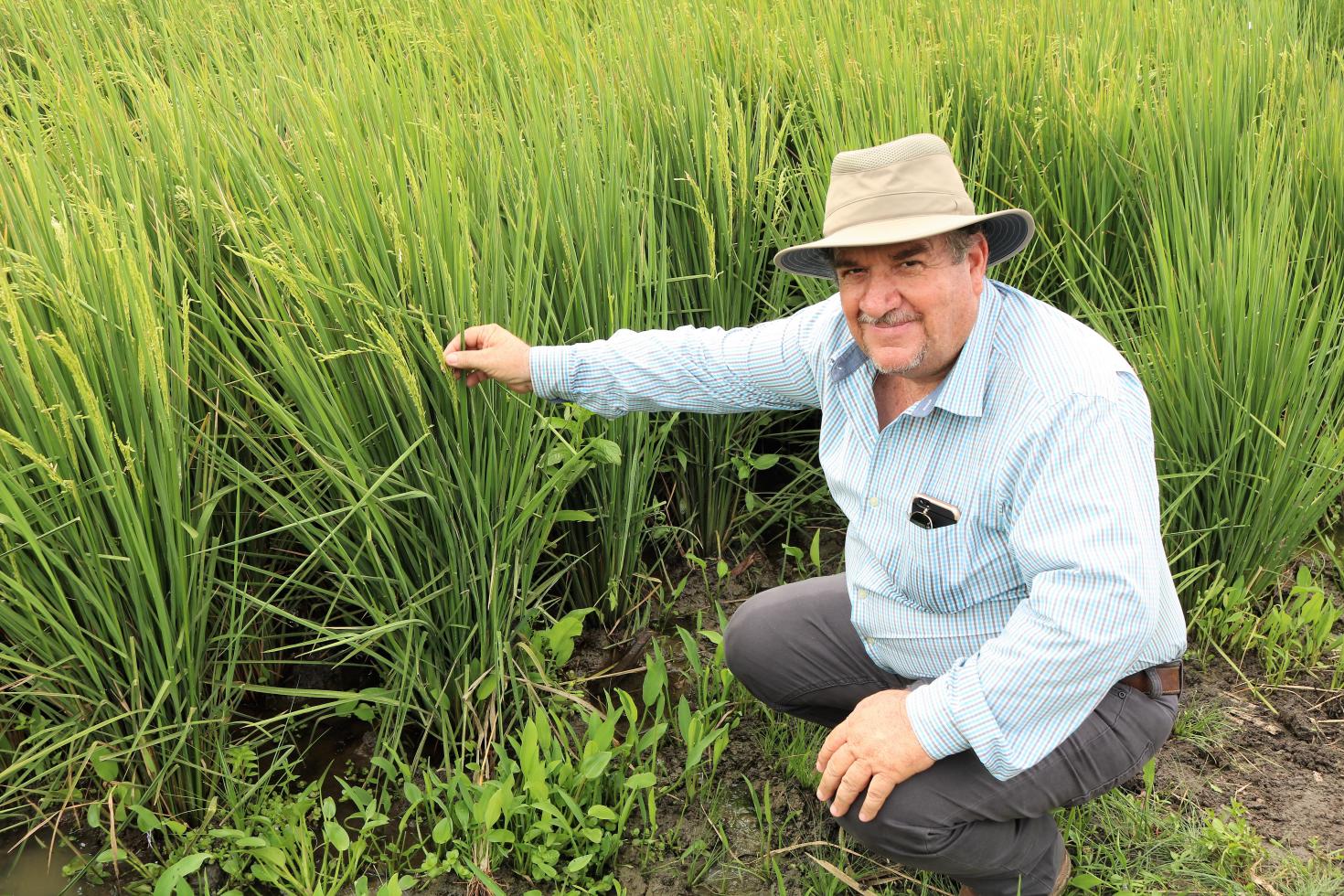The SRI methodology, which reduces the economic cost and environmental impact of rice farming, is contributing to renewing production on farms in Costa Rica and other Latin American countries.

San Jose, 29 August 2019 (IICA). Israel Araya is a rice producer in Bagaces, Costa Rica, whose conventional farming practices resulted in unsuccessful harvests, and, consequently, substantial losses. He could never have imagined that a virtual course would open the door to innovation.
In 2018, after 34 years of farming, Israel faced one final setback in production alongside his children Steven and Marlon, whom he had convinced to venture into rice farming in order to enhance their livelihood and identify opportunities for improvement.
“We harvested rice of a very poor quality, which hardly anyone wanted to buy; therefore, we experienced losses,” remarked Israel. His son Steven was the one who came across the course entitled “System of Rice Intensification: Producing more with less,” on the e-learning platform of the Inter-American Institute for Cooperation on Agriculture (IICA).
“I took the course and followed all of the lessons to the letter. I realized that, if we wanted to continue farming rice, we would need to transition toward and utilize this method, which provides a great deal of benefits,” explained Steven Araya.
The System of Rice Intensification (SRI) is an agro-ecological methodology for rice production that increases yields, reduces financial and environmental costs, and is more resilient to climate change. SRI originated in Madagascar in the 1980s.
The SRI methodology is based on four basic principles: early, quick and healthy plant establishment; reduced plant density; healthy soil conditions through aeration and enrichment with organic matter; and improved water management through the alternative wetting and drying of soil. The course is available for free at the following address: elearning.iica.int.
Over the past six years, IICA has been working with partner institutions and receiving expert advice from Cornell University in the United States in order to adapt the SRI system for use in Latin America and the Caribbean. Countries like Chile, Colombia, Costa Rica, Panama, the Dominican Republic and Venezuela have implemented SRI and have achieved promising results.
“At the Institute, we are seeking to expand knowledge of SRI across the hemisphere, support demonstration initiatives, generate tools to facilitate its implementation, as well as foster horizontal and regional cooperation in matters related to this topic,” stated Kelly Witkowski, Technical Specialist in Climate Change, Natural Resources and Management of Production Risks at IICA.
Israel and his children are reaping the benefits of SRI on their plot of land in Bagatzí de Bagaces in the province of Guanacaste in Costa Rica. Conventional rice farming practices are implemented on only one of their almost 13 hectares of land, in order to compare results.
“With respect to seeds for planting, we went from utilizing between 100 and 120 kilograms per hectare to just 24 kilograms, and reduced water use by 30%. Our plants are stronger, cleaner and healthier, without any diseases or bacteria; their stalks are thicker, their ears are more developed, and they contain more grains,” explained the farmer.
“I wasn’t expecting this, but I am very pleased with the results. This is environmentally-friendly rice. We conducted the entire phytosanitary control process using microorganisms to control pests and diseases, fungi and bacteria,” added Araya.
Rice partners
The National Rice Corporation (CONARROZ) and the National Institute of Agricultural Innovation and Technology Transfer (INTA) have assisted Israel Araya in updating his farming practices.
“We provide him with support on a weekly basis to assist him in analyzing the agronomic variables of evaluations, as well as pests, diseases, weeds and soil preparation,” indicated technical specialist Berter Martínez of CONARROZ.
Israel Araya’s innovation process caught the attention of El Pelón de la Bajura, one of the largest rice companies in Costa Rica, and that of other small-scale farmers in the area.
“I came to them to buy seed with the aim of farming rice for commercial use. However, when I mentioned that my plot of land was new to this crop, they gave me registered seed to produce certified seed,” explained Araya. This seed is purchased by El Pelón de la Bajura.
The goal is to expand the use of this farming methodology on more farms in the area. “We hope that our plot of land can serve as a sort of school for those who wish to do things differently by changing their farming methodology, with the aim of achieving greater yields and increasing economic benefits,” stated Araya.
“SRI is a system with great potential to be developed here. It is almost impossible to survive under the conventional production system,” he concluded.
More information:
Kelly Witkowski, Technical Specialist in Climate Change, Natural Resources and Management of Production Risks at IICA.
Kenneth Solano, Specialist in Project Management and Agribusiness at the IICA Delegation in Costa Rica.











